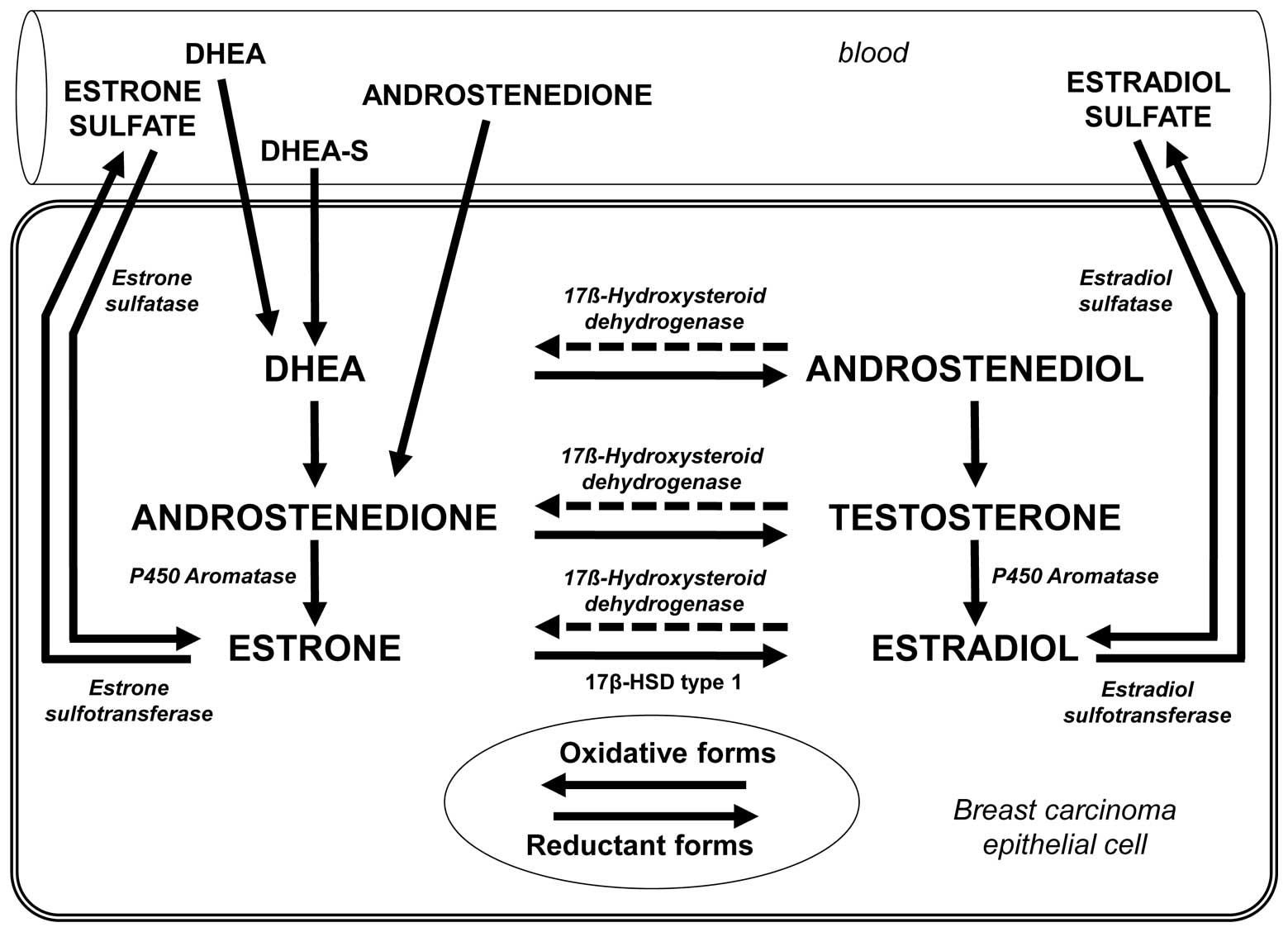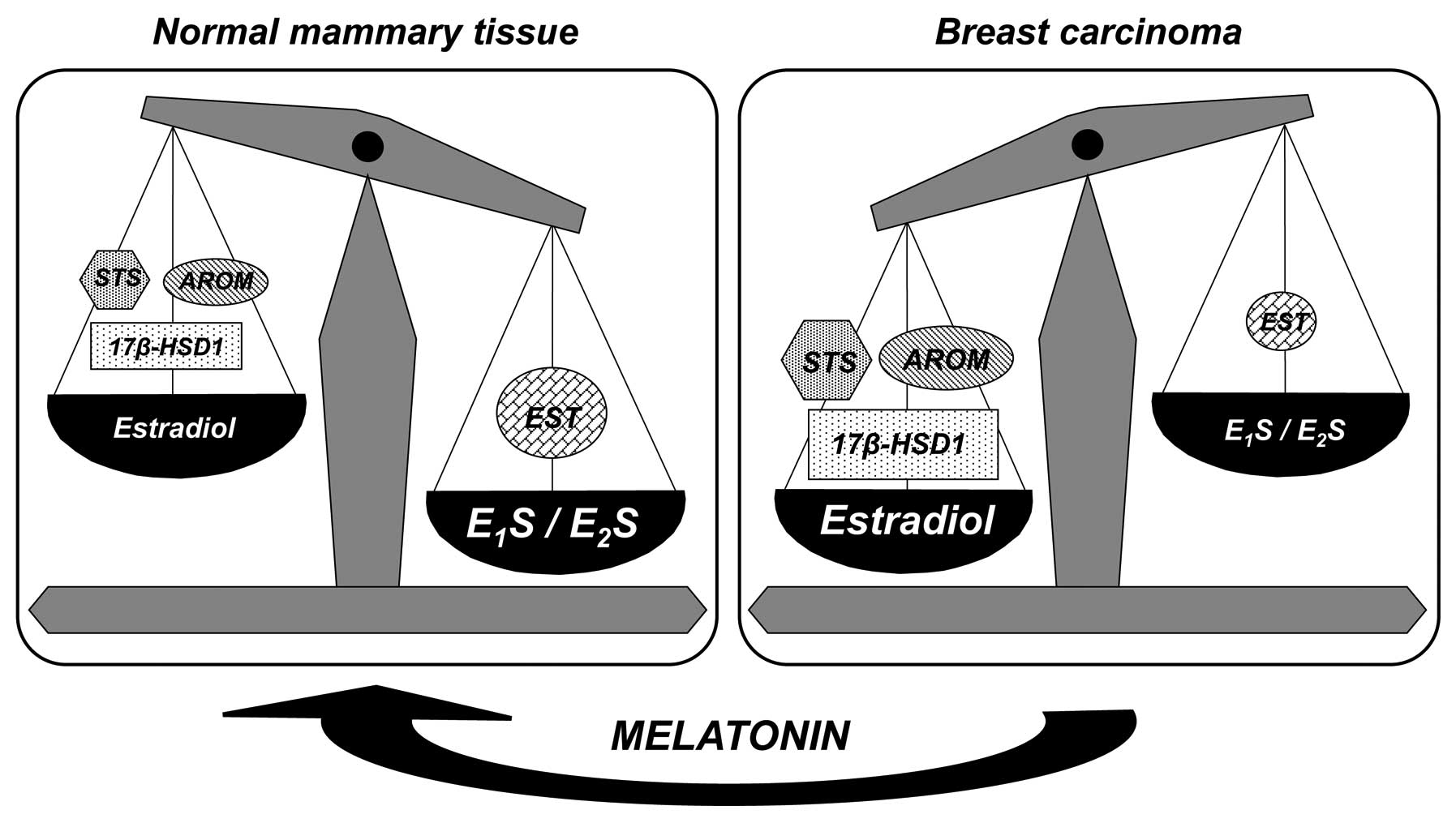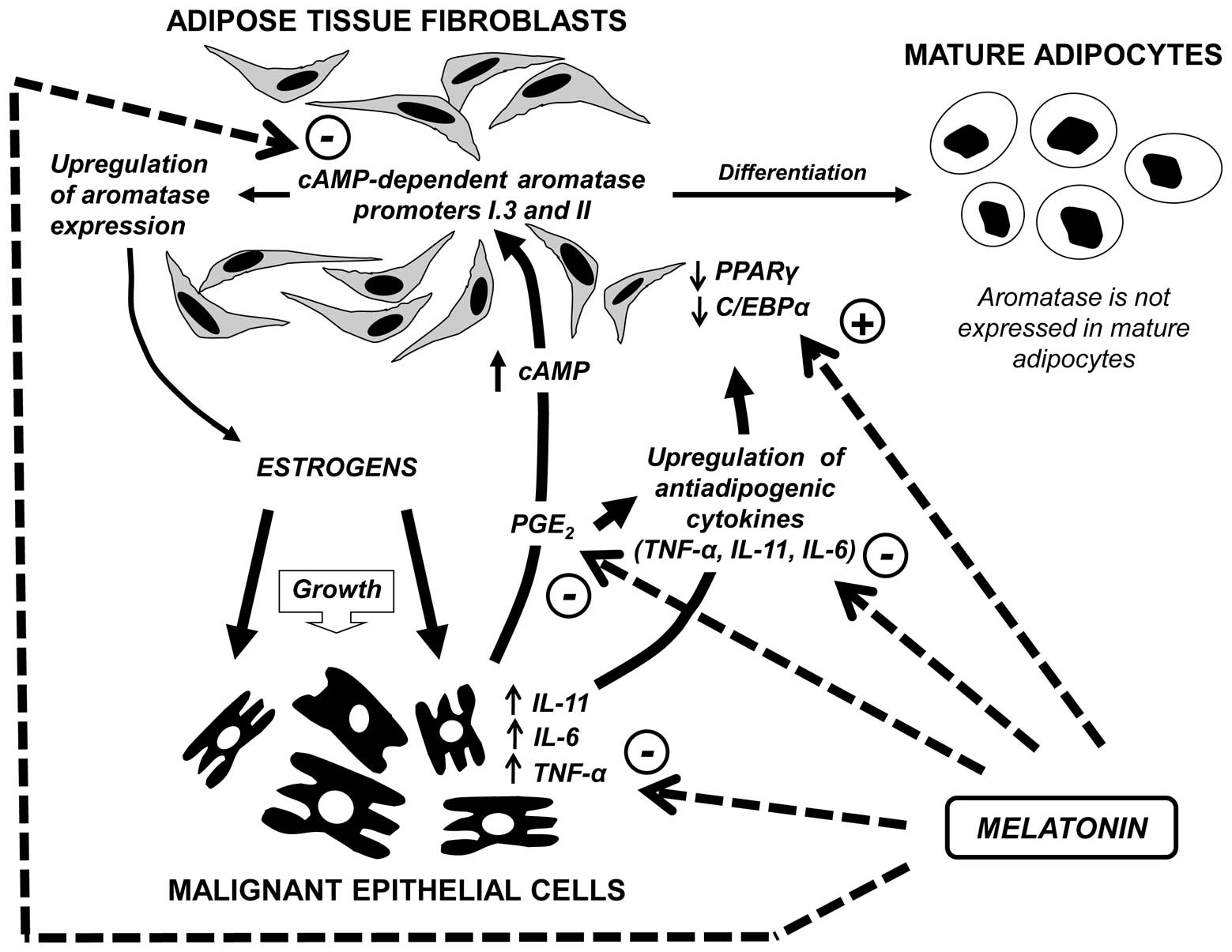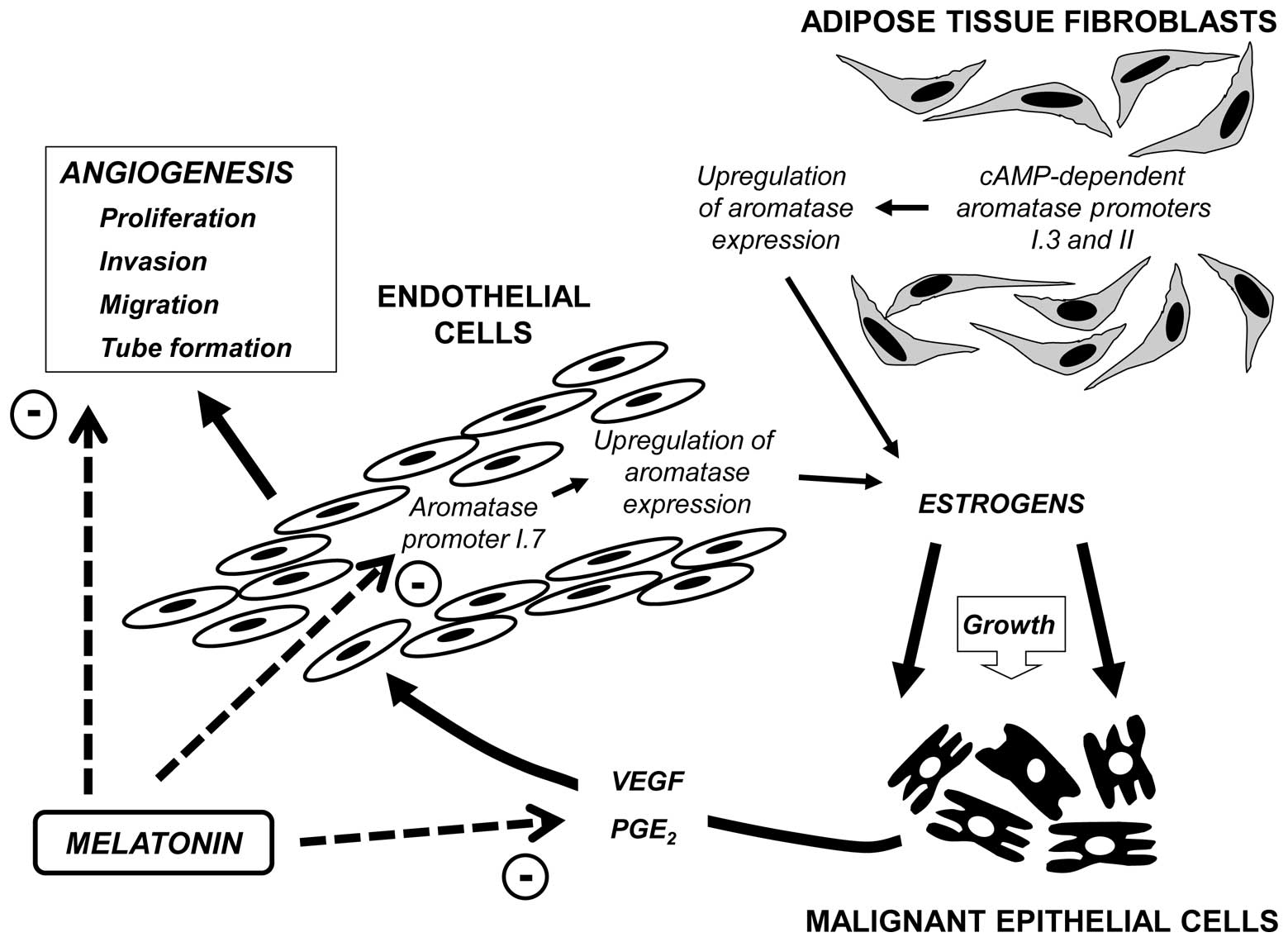|
1
|
Cos S and Sánchez-Barceló EJ: Melatonin
and mammary pathological growth. Front Neuroendocrinol. 21:133–170.
2000.
|
|
2
|
Cos S and Sánchez-Barceló EJ: Melatonin,
experimental basis for a possible application in breast cancer
prevention and treatment. Histol Histopathol. 15:637–647. 2000.
|
|
3
|
Blask DE, Sauer LA and Dauchy RT:
Melatonin as a chronobiotic/anticancer agent: cellular, biochemical
and molecular mechanisms of action and their implications for
circadian-based cancer therapy. Curr Topics Med Chem. 2:113–132.
2002.
|
|
4
|
Sánchez-Barceló EJ, Cos S, Fernández R and
Mediavilla MD: Melatonin and mammary cancer: a short review. Endocr
Relat Cancer. 10:153–159. 2003.
|
|
5
|
Sánchez-Barceló EJ, Cos S, Mediavilla MD,
Martínez-Campa CM, González A and Alonso-González C:
Melatonin-estrogen interactions in breast cancer. J Pineal Res.
38:217–222. 2005.
|
|
6
|
Cohen M, Lippman M and Chabner B: Role of
pineal gland in aetiology and treatment of breast cancer. Lancet.
2:814–816. 1978.
|
|
7
|
Cos S, González A, Martínez-Campa C,
Mediavilla MD, Alonso-González C and Sánchez-Barceló EJ:
Estrogen-signaling pathway: a link between breast cancer and
melatonin oncostatic actions. Cancer Detect Prev. 30:118–128.
2006.
|
|
8
|
Reiter RJ: The pineal and its hormones in
the control of reproduction in mammals. Endocr Rev. 1:109–131.
1980.
|
|
9
|
Molis TM, Spriggs LL and Hill SM:
Modulation of estrogen receptor mRNA expression by melatonin in
MCF-7 human breast cancer cells. Mol Endocrinol. 8:1681–1690.
1994.
|
|
10
|
Cos S, Blask DE, Lemus-Wilson A and Hill
SM: Effects of melatonin on the cell cycle kinetics and estrogen
rescue of MCF-7 human breast cancer cells in culture. J Pineal Res.
10:36–42. 1991.
|
|
11
|
Hill SM, Spriggs LL, Simon MA, Muraoka H
and Blask DE: The growth inhibitory action of melatonin on human
breast cancer cells is linked to the estrogen response system.
Cancer Lett. 64:249–256. 1992.
|
|
12
|
Cos S, Martínez-Campa C, Mediavilla MD and
Sánchez-Barceló EJ: Melatonin modulates aromatase activity in MCF-7
human breast cancer cells. J Pineal Res. 38:136–142. 2005.
|
|
13
|
González A, Martínez-Campa C, Mediavilla
MD, et al: Effects of MT1 melatonin receptor overexpression on the
aromatase-suppressive effect of melatonin in MCF-7 human breast
cancer cells. Oncol Rep. 17:947–955. 2007.
|
|
14
|
Cos S, González A, Güezmes A, Mediavilla
MD, Martínez-Campa C, Alonso-González C and Sánchez-Barceló EJ:
Melatonin inhibits the growth of DMBA-induced mammary tumors by
decreasing the local biosynthesis of estrogens through the
modulation of aromatase activity. Int J Cancer. 118:274–278.
2006.
|
|
15
|
Martínez-Campa C, González A, Mediavilla
MD, Alonso-González C, Sánchez-Barceló EJ and Cos S: Melatonin
enhances the inhibitory effect of aminoglutethimide on aromatase
activity in MCF-7 human breast cancer cells. Breast Cancer Res
Treat. 94:249–254. 2005.
|
|
16
|
Simpson ER: Role of aromatase in sex
steroid action. J Mol Endocrinol. 25:149–156. 2000.
|
|
17
|
van Landeghem AA, Poortman J, Nabuurs M
and Thijssen JH: Endogenous concentration and subcellular
distribution of estrogens in normal and malignant human breast
tissue. Cancer Res. 45:2900–2906. 1985.
|
|
18
|
Pasqualini JR: The selective estrogen
enzyme modulators in breast cancer: a review. Biochim Biophys Acta.
1654:123–143. 2004.
|
|
19
|
Pasqualini JR and Chetrite GS: Recent
insight on the control of enzymes involved in estrogen formation
and transformation in human breast cancer. J Steroid Biochem Mol
Biol. 93:221–236. 2005.
|
|
20
|
Conley A and Hinshelwood M: Mammalian
aromatases. Reproduction. 121:685–695. 2001.
|
|
21
|
Santen RJ and Harvey HA: Use of aromatase
inhibitors in breast carcinoma. Endocr Relat Cancer. 6:75–92.
1999.
|
|
22
|
Suzuki T, Miki Y, Nakamura Y, et al: Sex
steroid-producing enzymes in human breast cancer. Endocr Relat
Cancer. 12:701–720. 2005.
|
|
23
|
Cos S, González A, Álvarez-García V,
Alonso-González C and Martínez-Campa C: Melatonin and breast
cancer: selective estrogen enzyme modulator. Advances in Cancer
Drug Targets. Atta-ur-Rahman: 1. 1st Edition. Bentham Science
Publishers; Sharjah (UAE): pp. 207–237. 2012
|
|
24
|
González A, Cos S, Martínez-Campa C,
Alonso-González C, Sánchez-Mateos S, Mediavilla MD and
Sánchez-Barceló EJ: Selective estrogen enzyme modulator actions of
melatonin in human breast cancer cells. J Pineal Res. 45:86–92.
2008.
|
|
25
|
Bulun SE, Lin Z, Imir G, et al: Regulation
of aromatase expression in estrogen-responsive breast and uterine
disease: from bench to treatment. Pharmacol Rev. 57:359–383.
2005.
|
|
26
|
Bulun SE, Sebastian S, Takayama K, Suzuki
T, Sasano H and Shozu M: The human CYP19 (aromatase p450) gene:
update on physiologic roles and genomic organization of promoters.
J Steroid Biochem Mol Biol. 86:219–224. 2003.
|
|
27
|
Díaz-Cruz ES, Shapiro CL and Brueggemeier
RW: Cyclooxygenase inhibitors suppress aromatase expression and
activity in breast cancer cells. J Clin Endocrinol Metab.
90:2563–2570. 2005.
|
|
28
|
Prosperi JR and Robertson FM:
Cyclooxygenase-2 directly regulates gene expression of P450 Cyp19
aromatase promoter regions pII, pI. 3 and pI7 and estradiol
production in human breast tumor cells. Prostaglandins Other Lipid
Mediat. 81:55–70. 2006.
|
|
29
|
Martínez-Campa C, González A, Mediavilla
MD, Alonso-González, Álvarez-García V, Sánchez-Barceló EJ and Cos
S: Melatonin inhibits aromatase promoter expression by regulating
cyclooxygenases expression and activity in breast cancer cells. Br
J Cancer. 101:1613–1619. 2009.
|
|
30
|
Wang J, Xiao X, Zhang Y, et al:
Simultaneous modulation of COX-2, p300, Akt, and Apaf-1 signaling
by melatonin to inhibit proliferation and induce apoptosis in
breast cancer cells. J Pineal Res. 53:77–90. 2012.
|
|
31
|
González A, Martínez-Campa C, Mediavilla
MD, Alonso-González C, Sánchez-Barceló EJ and Cos S: Inhibitory
effects of pharmacological doses of melatonin on aromatase activity
and expresión in rat glioma cells. Br J Cancer. 97:755–760.
2007.
|
|
32
|
González A, Martínez-Campa C, Mediavilla
MD, Alonso-González C, Álvarez-García V, Sánchez-Barceló EJ and Cos
S: Inhibitory effects of melatonin on sulfatase and
17β-hydroxysteroid dehydrogenase activity and expression in glioma
cells. Oncol Rep. 23:1173–1178. 2010.
|
|
33
|
González A, Álvarez-García V,
Martínez-Campa C, Mediavilla MD, Alonso-González C, Sánchez-Barceló
EJ and Cos S: In vivo inhibition of the estrogen sulfatase enzyme
and growth of DMBA-induced mammary tumors by melatonin. Curr Cancer
Drug Tar. 10:279–286. 2010.
|
|
34
|
Meng L, Zhou J, Sasano H, Suzuki T,
Zeitoun KM and Bulun SE: Tumor necrosis factor α and interleukin 11
secreted by malignant breast epitelial cells inhibit adipocyte
differentiation by selectively down-regulating CCAAT/enhancer
binding protein α and peroxisome proliferator-activated receptor γ:
mechasnism of desmoplastic reaction. Cancer Res. 61:2250–2255.
2001.
|
|
35
|
Bulun SE, Chen D, Lu M, et al: Aromatase
excess in cancers of breast, endometrium and ovary. J Steroid
Biochem Mol Biol. 106:81–96. 2007.
|
|
36
|
Ntambi JM and Kim YC: Adipocyte
differentiation and gene expression. J Nutr. 130:3122S–3126S.
2000.
|
|
37
|
González A, Álvarez-García V,
Martínez-Campa C, Alonso-González C and Cos S: Melatonin promotes
differentiation of 3T3-L1 fibroblasts. J Pineal Res. 52:12–20.
2012.
|
|
38
|
Knower KC, To SQ, Takagi K, et al:
Melatonin suppresses aromatase expression and activity in breast
cancer associated fibroblasts. Breast Cancer Res Treat.
132:765–771. 2012.
|
|
39
|
Álvarez-García V, González A,
Alonso-González C, Martínez-Campa C and Cos S: Melatonin interferes
in the desmoplastic reaction in breast cancer by regulating
cytokine production. J Pineal Res. 52:282–290. 2012.
|
|
40
|
Harada N, Sasano H, Murakami H, Ohkuma T,
Nagura H and Takagi Y: Localized expression of aromatase in human
vascular tissues. Circ Res. 84:1285–1291. 1999.
|
|
41
|
Mukherjee TK, Dinh H, Chaudhuri G and
Nathan L: Testosterone attenuates expression of vascular cell
adhesion molecule-1 by conversion to estradiol by aromatase in
endothelial cells: implications in atherosclerosis. Proc Nat Acad
Sci USA. 6:4055–4060. 2002.
|
|
42
|
Sebastian S, Takayama K, Shozu M and Bulun
SE: Cloning and characterization of a novel endothelial promoter of
the human CYP19 (aromatase P450) gene that is upregulated in breast
cancer tissue. Mol Endocrinol. 10:2243–2254. 2001.
|
|
43
|
Senger DR, Van De Water L, Brown LF, et
al: Vascular permeability factor (VPF, VEGF) in tumor biology.
Cancer Metastasis Rev. 12:303–324. 1993.
|
|
44
|
Liang Y and Hyder SM: Proliferation of
endothelial and tumor epithelial cells by progestin-induced
vascular endothelial growth factor from human breast cancer cells:
paracrine and autocrine effects. Endocrinology. 146:3632–3641.
2005.
|
|
45
|
Álvarez-García V, González A,
Martínez-Campa C, Alonso-González C and Cos S: Melatonin modulates
aromatase activity and expression in endotelial cells. Oncol Rep.
29:2058–2064. 2013.
|
|
46
|
Álvarez-García V, González A,
Alonso-González C, Martínez-Campa C and Cos S: Regulation of
vascular endotelial growth factor by melatonin in human breast
cáncer cells. J Pineal Res. 54:373–380. 2013.
|
|
47
|
Álvarez-García V, González A,
Alonso-González C, Martínez-Campa C and Cos S: Antiangiogenic
effects of melatonin in endotelial cell cultures. Microvasc Res.
87:25–33. 2013.
|


















